BORN 1762 – DIED 1822
“William Siprell Sr. was the founder of the Sipprell Family of New Brunswick, Canada. Family tradition asserts that he was of French Huguenot descent but nothing of his ancestry is known for certain. It is also not certain but he may have been born in Pennsylvania about 1762. He enlisted in the New Jersey Volunteers, a Loyalist regiment, January 18, 1780 and served the remainder of the American Revolution. He came to Saint John, New Brunswick, and was disbanded there. He was granted a lot on the south side of Trout River.
“According to his own testimony, William Siprell, Senr., enlisted in the notable New Jersey Volunteers (muster rolls give the date, 18 January 1780) at the age of about eighteen. From the typed transcripts of muster rolls preserved in the New Brunswick Museum, Saint John, New Brunswick, the following facts concerning his services have been gleaned:
On 14 July and again on 11 September 1780, he was on Staten Island, N.Y. – headquarters of the New Jersey Volunteers.
In December 1780, he was reported “on guard”.
On 9 February 1781, he was reported “on command at Tucker’s Ferry”.
On 25 July 1781, again on Staten Island.
On 13 October 1781, on Staten Island under the command of Lt. Col. Joseph Barton.
On 27 November 1781, again “on command at Tucker’s Ferry”.
On 18 February 1782, he was on Staten Island.
On 27 July 1782, he was at Paulas Hook (now Jersey City). Sometime in late September or early October 1782, he was “on guard alarm post Long Island”.
From 25 October to 24 December 1782 (inclusive), he was again “on guard”.
On 25 January and 4 March and in May 1783, he was at New Town, Long Island, with Capt. Joseph Crowell’s Company of the First Battalion of the New Jersey Volunteers.
From 24 August until 24 October 1783 (inclusive), he was still in service.
Of the New Jersey Volunteers, W.S. Stryker writes:All of these soldiers immediately on enlistment were placed on active service, and they began to distinguish themselves at an early day in their great zeal to annoy, intimidate, and injure their former friends and neighbours.”
According to a report by Col. Richard Hewlett, the First Battalion of the New Jersey Volunteers reached the River St. John, 27, September 1783, in Duke of Richmond (865 tons, Richard Davis, Master). On 13 October, he further reported: “This day the entire of the troops were disbanded and are getting up the river as speedily as possible. The want of small craft is the only delay they have.” The facts of the matter were, however, somewhat different. The various regiments had drawn blocks of land on the banks of the river, but no attempt had been made to run lines and, consequently, the greatest confusion existed. Five of the regiments, including the First New Jersey Volunteers, refused their blocks outright because they were located far up the river. The disbanded men scattered; some remained the winter in Parr Town (now Saint John) where many lived on Barracks Square in “Lower Cove” in tents covered with evergreen boughs and banked with snow; others sought out unoccupied land where-ever it might be located.”
Page 6, Howard Fritz Sipprell
“Prior to 1790, William Siprell, Senr., settled on the “First Tract” in Kings County, Studholme Parish, which was granted to : John Fournie and Others”.
As a Memorialist, William Sipperill remained in possession of his lot and after another petition four years later, was granted 210 acres described as lot 58 on the south side of Trout River, a tributary of the Kennebecasis.(see the following map of Sussex)
In 1790, William married Sarah Sally Foster who goes by “Sally”. In the early years of the nineteenth century, land in Carleton County was being opened up. William, Sally and their young family also migrated up the Saint John River to an area just below the present town of Hartland. In 1814 William Siprell petitioned for two lots (400 acres) opposite the lower end of Becaguimic Island and cut by a brook that made a deep valley with steep sides – plainly recognizable today, and called Acker’s Brook. These two lots were granted to William Siprell in 1815 by which date he had already been living there for at least five years. They spent the rest of their lives in this area.”
The following information is gathered from the book “William Siprell, Senr. and the family that he founded.” By Harold Fritz Sipprell 1900-1976
You will notice that the name Sipprell is spelled many different ways in the historical documents : Siprell, Sipprelle, Sipperill. “It was the Huguenots’ annoying custom of changing the spelling of their names in order to hasten their assimilation and to destroy the last tie with their former homeland, from which they had fled to escape utter annihilation.” p. 5 HFS
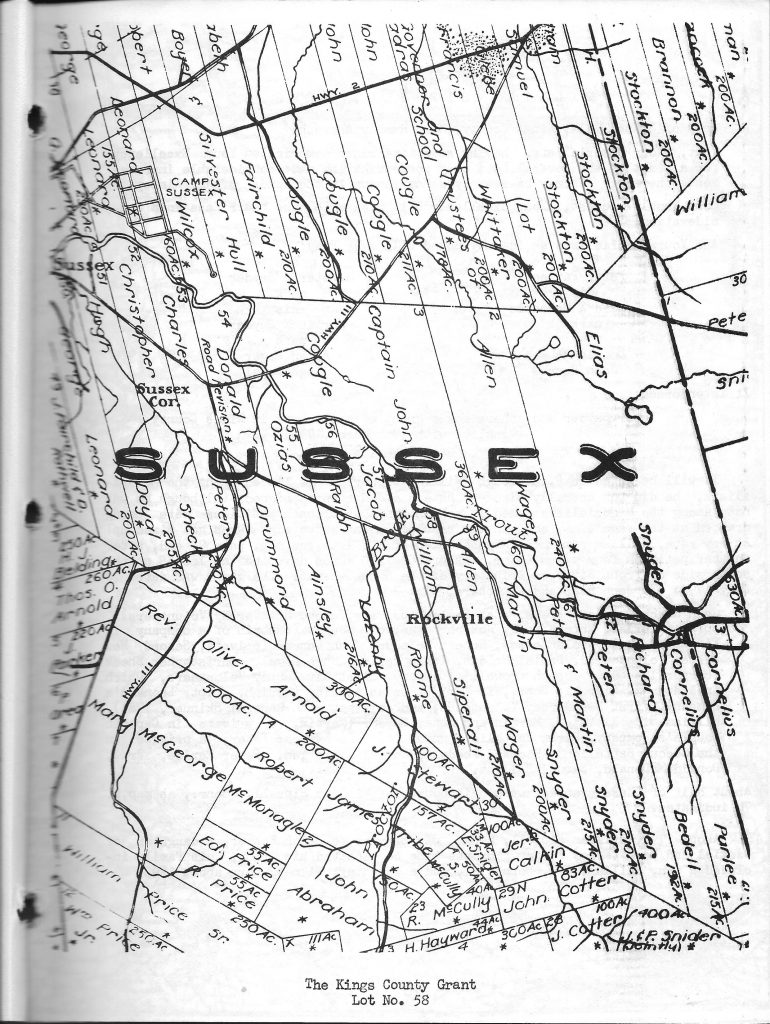
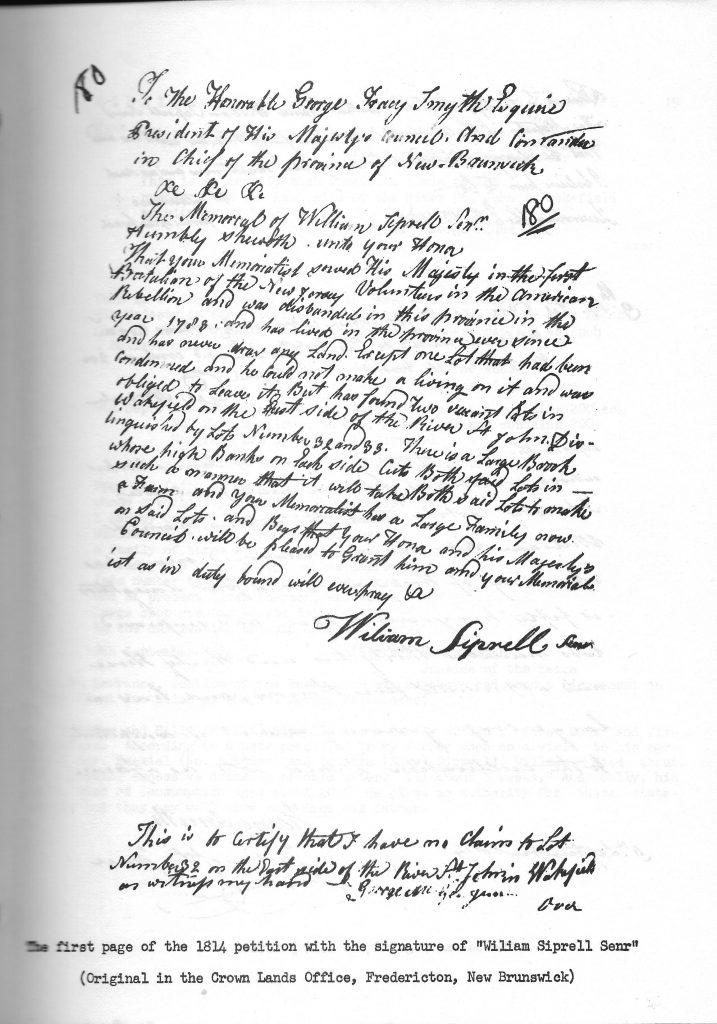
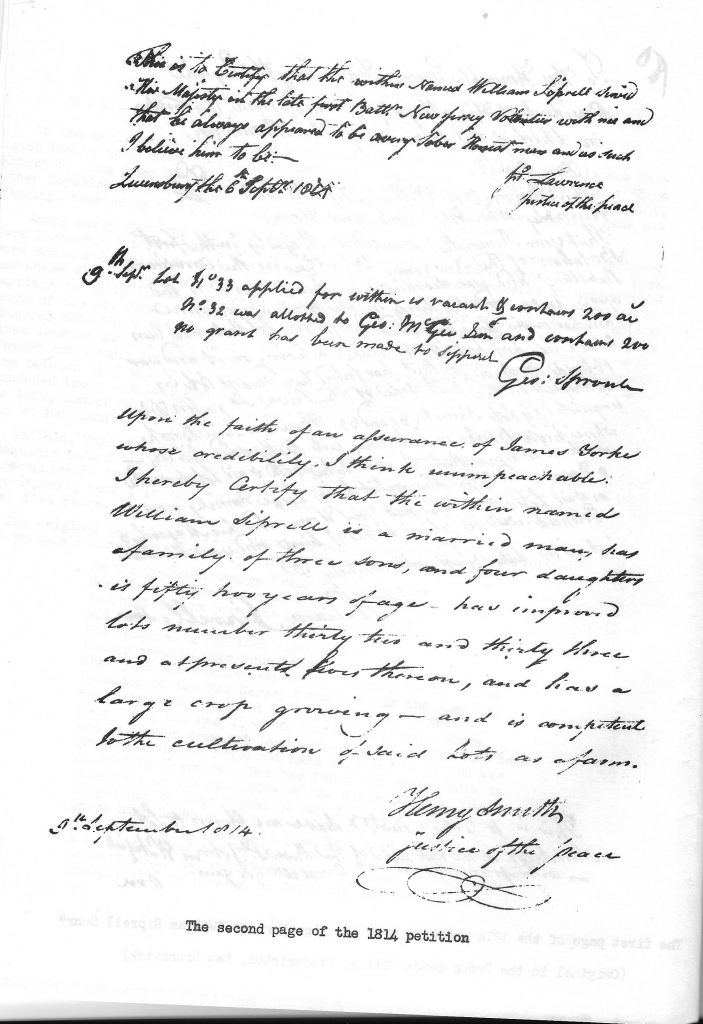
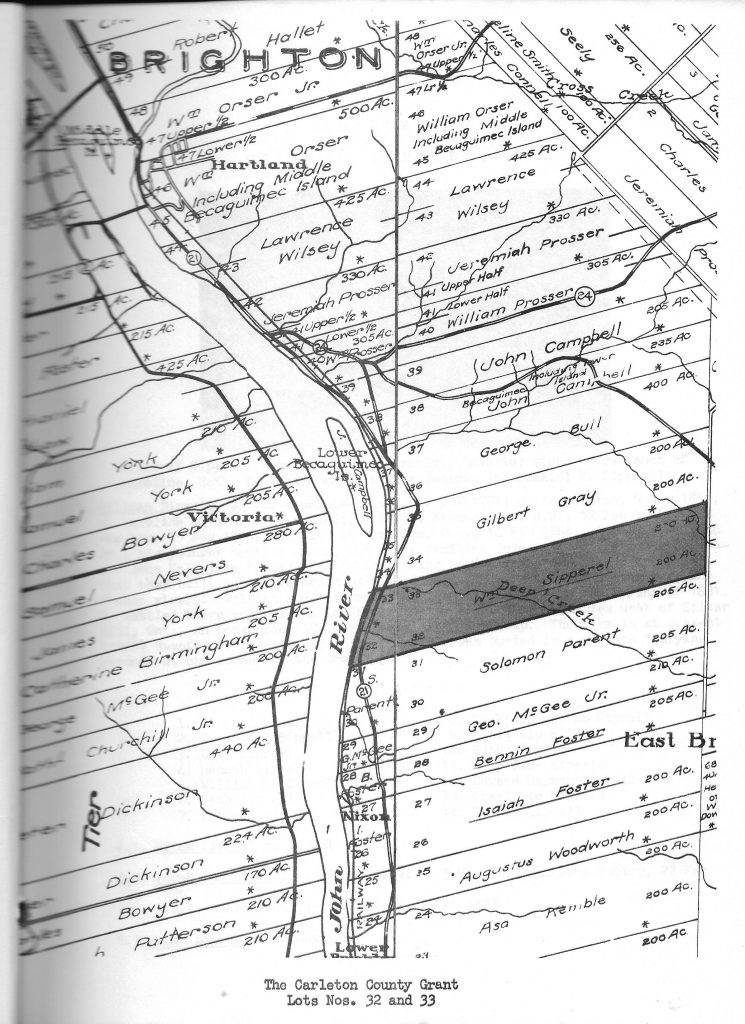
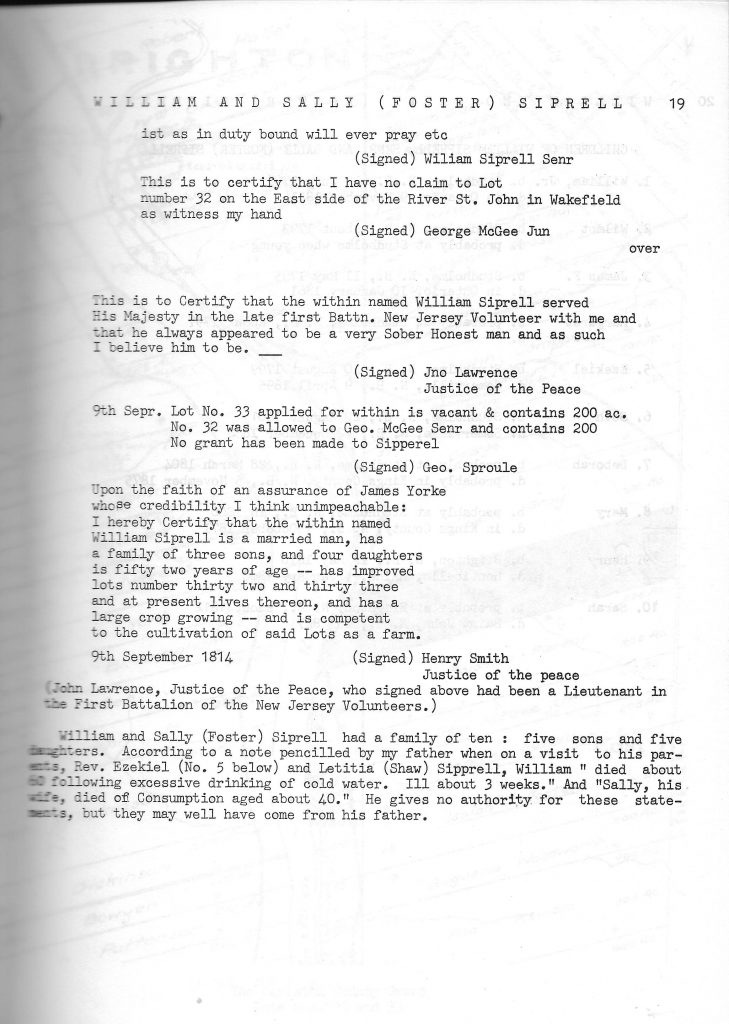
Typical of information handed down in the family are such rather contradictory tales as the following received from two grand-daughters of Seth Siprell, another son of William Siprell, Sr.
“I thought you might like to hear what our mother told us of the ‘coming over’ of my father’s family. This is what she told us. The father of William that you start with was driven out of France during the Huguenot persecution. Came to America and settled in the Wyoming Valley in Pennsylvania. This man had seven sons, one your William. They were all pressed into the Revolutionary Army to the British Army, and served til the end of the war,went to New Brunswick and got a grant of land.”– Susan Sipprell Bolt, Tacoma, WA, 30 March 1939–
“In time to come, it may be of interest to some member of our family to know who the founder of our branch of the Siprelle family was and where he came from to America. As far as we have ever known William Siprelle, the head of our family in New Brunswick, Canada, came from Normandy, France, to the New England states, settled and married in Pennsylvania, at the time of the American Revolution. He was among the United Empire Royalists (sic’) who came to fight for England against the American colonists. Later he settled in New Brunswick, and Seth Siprelle was one of his sons.” — Minnie Belle Siprelle, Red Lodge, Montana, 24, August 1941′
My father Arthur Sipprell had a completely different story of his family history. He told of four brothers who left France to seek their fortunes as Pirates or Privateers. I believe my father thought that the brothers were kicked out of France. They commandeered ships during the Revolutionary War. The French name Sipprelle had a letter e which was later dropped. –Art Sipprell, Lake Stevens, WA 1996